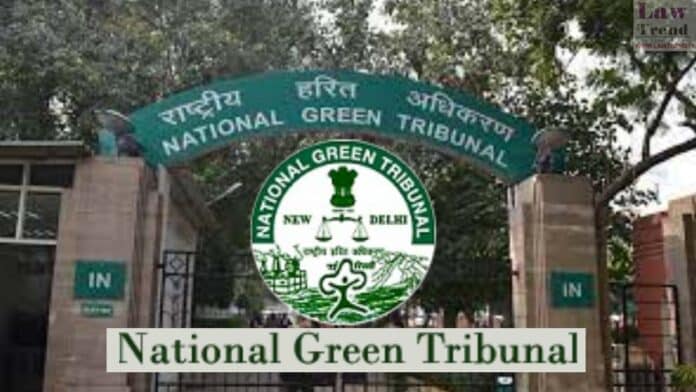As large swathes of India gasped for breath, choking on air laden with contaminants, the National Green Tribunal grappled with a wide range of environmental issues, including pollution of the Ganga and quality and quantity of groundwater and air pollution in 2023. It went to the extent of imposing huge penalties on states like Delhi and Bihar for poor liquid and solid waste management.
In February, the tribunal directed the Delhi government to pay Rs 2,232 crore as environmental compensation for improper management of solid and liquid waste, while in May it imposed a staggering Rs 4,000 crore compensation on Bihar.
The green panel also passed orders to check over-exploitation of natural resources.

It took suo motu (on its own) cognisance of industrial and environmental disasters, and awarded compensation to the victims.
A highlight of the tribunal’s directions involved restoring the pristine sanctity of rivers, many of which are venerated entities like the Ganga and Yamuna. Express orders were passed for not discharging sewage into the rivers and for protecting the floodplains.
Acknowledging the pressing issue of pollution of the Ganga and its tributaries in West Bengal, Uttarakhand, Uttar Pradesh, Bihar and Jharkhand, the NGT sought a report from each district from the District Ganga Protection Committees headed by the District Magistrate across the five states.
While dealing with complaints about encroachment and pollution of water bodies, the tribunal directed the authorities concerned to restore them to their original form.
The tribunal observed that nearly all states and Union Territories (UTs) were yet to bridge the gap between sewage generation and treatment. It noted the estimates which said around 30,000 million litres per day (MLD) of sewage was still left untreated.
The reasons for improper liquid waste management included non-utilisation of the installed capacity of Sewage Treatment Plants (STPs), lack of household sewage connections and treated sewage getting mixed with untreated sewage in drains, the tribunal noted.
Underscoring that legacy waste dumped across cities was like a “ticking time bomb”, the tribunal ordered their remediation through biomining and other measures. Biomining involves an environmentally friendly technique to separate soil and recyclable material like plastic, metal, paper, textile, construction and demolition waste from legacy waste.
A major initiative of the tribunal launched during the year was monitoring the gaps in solid and liquid waste across states and UTs, and imposing environmental compensation on deficient stakeholders.
On May 21, the green panel concluded its proceedings on solid and liquid waste management by all states and UTs, and said the way forward is to accord high priority to the subject and ensure strict monitoring.
The tribunal determined a total compensation of Rs 79,234.36 crore and asked the states and UTs concerned to keep the amount in a separate ring-fenced account which was to be used for restoration measures.
It adjudicated matters on the use of groundwater by stadiums and groundwater contamination in Uttar Pradesh’s Kanpur and Sangrur in Punjab, noting their quality and falling levels across 27 states, and the need for replenishment by rainwater harvesting.
The tribunal flagged natural disasters, as reported in Joshimath (Uttarakhand), and heard matters relating to cracks in houses, roads and other infrastructure in the state, besides those in Jammu and Kashmir’s Doda. It also took note of such damage caused in Uttarakand’s Mussoorie and ordered measures for prevention of environmental damage in the wider Himalayan region.
It asked the authorities concerned to assess the carrying capacity of pilgrim centres in Uttarakhand, including the famous ‘Chardham’-Kedarnath, Badrinath, Gangotri and Yamunotri- to sustain tourism load and evolve an environment management plan.
In ecological terms, the phrase carrying capacity means the number of people, animals, or crops which a region can support without environmental degradation.
The tribunal also gave impetus to wildlife protection and directed sanctuaries to notify their boundaries to prevent encroachment.
During the year, it passed directions for protecting the Soor Sarovar bird sanctuary in Agra and Dhanauri Saras sanctuary in Uttar Pradesh.
Also Read
The tribunal, on its own, took up the Air Quality Index (AQI) management issues in the Delhi-National Capital Region (NCR) and across several states.
It directed the chief secretaries of the states where the AQI had dipped to poor, very poor and severe categories to take immediate remedial action.
The tribunal emphasised the need for having an advance action plan to curb stubble burning.
Underscoring that the “psychological aspect” of the dip in the air quality in the national capital required to be examined, the NGT sought replies from government authorities, including the Union Ministry of Environment, Forest and Climate Change and the director of the All India Institute of Medical Sciences (AIIMS), Delhi.
According to data available on the NGT website, the tribunal, across all its benches, settled 27,115 matters.







